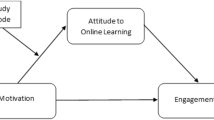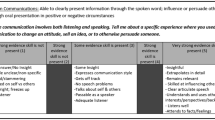Abstract
Objective
Determine and describe the impact of student/student mentoring (SSM) on the senior medical student mentor involved in a formal SSM program.
Method
An anonymous online survey was administered to fourth-year medical students at the University of North Carolina with questions regarding participation in SSM programs (formal and informal) as well as the impact of these experiences. Responses from fourth-year mentors were compared to non-mentors’ answers. Data was analyzed to assess the value of, understand motivations for not participating in, and to describe perceptions regarding SSM.
Results
One hundred seven of 178 students in the fourth-year class completed the survey, a 60% response rate. Forty-two students participated in the formal SSM program, 48 did not have mentors (non-mentors), and 17 were excluded as they participated in informal mentoring programs. There were no differences in gender, age, or matched specialty between mentors and non-mentors. Ninety-five percent of all students agreed that SSM was valuable in a way that was different from student/resident or student/faculty mentoring. Mentors were nearly twice as non-mentors likely to believe that being the mentee in an SSM relationship would be beneficial. In addition, mentors were 4 times more likely to believe that being a mentor in an SSM program was valuable and 83% stated they would mentor again. Lastly, nearly three quarters of mentors felt that this was a worthwhile experience.
Conclusions
Students who served as mentors as part of an SSM program had positive experiences and found it a valuable addition to traditional faculty/student mentoring.

Similar content being viewed by others
References
Crisp GCI. Mentoring college students: a critical review of the literature between 1990 and 2007. Res High Educ. 2009;50(6):525–45. https://doi.org/10.1007/s11162-009-9130-2.
Merriam-Webster Inc. Merriam-Webster’s dictionary of law. Springfield. Massachusetts: Merriam-Webster, Incorporated; 2016.
Cohen NH. Development and validation of the principles of adult mentoring for faculty mentors in higher education [dissertation]. Philadelphia: Temple University; 1993.
Jacobi M. Mentoring and undergraduate academic success: a literature review. Rev Educ Res. 1991;61(4):505–32.
Allard WG, Dodd JM, Peralez E. Keeping LD students in college. Acad Ther. 1987;22(4):359–65.
Fagenson EA. The mentor advantage: perceived career/job experiences of Protégés Versus Non-protégés. J Organ Behav. 1989;10(4):309–20.
Evans NJ, Bourassa DM, Woolbright C. Working with young undergraduate women. New Dir Stud Serv. 1985;1985(29):45–9.
Frei E, Stamm M, Buddeberg-Fischer B. Mentoring programs for medical students--a review of the PubMed literature 2000–2008. BMC Med Educ. 2010;10:32. https://doi.org/10.1186/1472-6920-10-32.
Jacobs S, Atack L, Ng S, Haghiri-Vijeh R, Dell’Elce C. A peer mentorship program boosts student retention. Nursing. 2015;45(9):19–22. https://doi.org/10.1097/01.NURSE.0000470424.40180.a0.
Garmel GM. Mentoring medical students in academic emergency medicine. Acad Emerg Med. 2004;11(12):1351–7. https://doi.org/10.1197/j.aem.2004.06.013.
Keyser DJ, Lakoski JM, Lara-Cinisomo S, Schultz DJ, Williams VL, Zellers DF, et al. Advancing institutional efforts to support research mentorship: a conceptual framework and self-assessment tool. Acad Med. 2008;83(3):217–25. https://doi.org/10.1097/ACM.0b13e318163700a.
Isenberg-Grzeda E, Weiss A, Blackmore MA, Shen MJ, Abrams MS, Woesner ME. A survey of American and Canadian psychiatry residents on their training, teaching practices, and attitudes toward teaching. Acad Psychiatry. 2016;40(5):812–5. https://doi.org/10.1007/s40596-016-0491-5.
Lau KS, Siong KH, Tang HY, Cheng PW, Cheung KS, Chan SW, et al. An innovative web-based peer support system for medical students in Hong Kong. Med Teach. 2007;29(9):984–6. https://doi.org/10.1080/01421590701551748.
Author information
Authors and Affiliations
Corresponding author
Ethics declarations
Conflict of Interest
The authors declare that they have no conflict of interest.
Ethical Approval
This study was approved by the University of North Carolina IRB committee.
Informed Consent
A statement of informed consent was sent with the survey link, and consent was implied by completion of the survey. The survey was anonymous.
Additional information
Publisher’s Note
Springer Nature remains neutral with regard to jurisdictional claims in published maps and institutional affiliations.
Previous Presentations
Breakout Presentation at the 2017 CREOG & APGO Annual Meeting in Orlando, Florida.
Electronic Supplementary Material
ESM 1
(XLSX 28 kb)
Rights and permissions
About this article
Cite this article
Fleischman, A., Plattner, A., Lee, J. et al. Insights into the Value of Student/Student Mentoring from the Mentor’s Perspective. Med.Sci.Educ. 29, 691–696 (2019). https://doi.org/10.1007/s40670-019-00739-9
Published:
Issue Date:
DOI: https://doi.org/10.1007/s40670-019-00739-9




